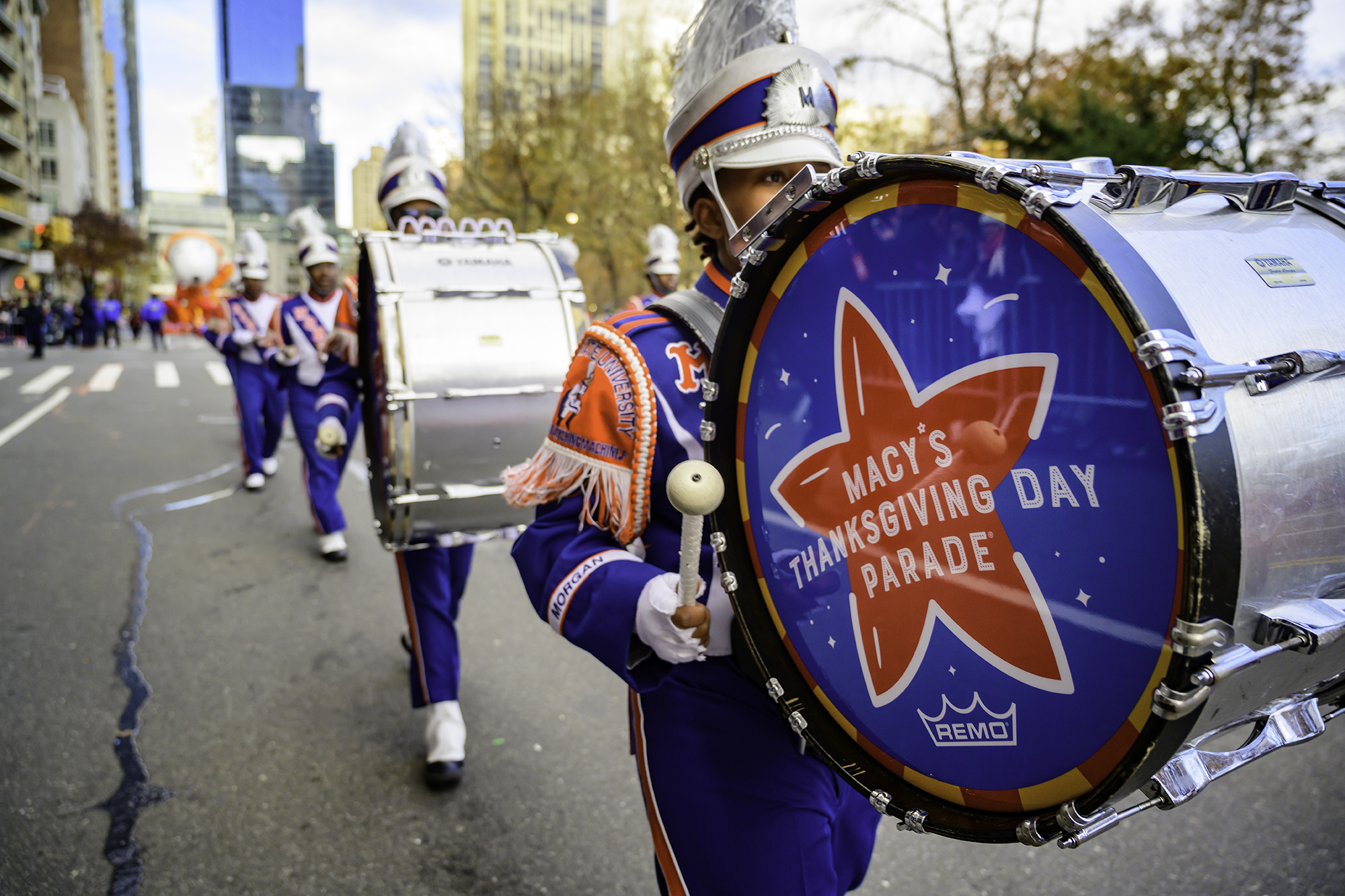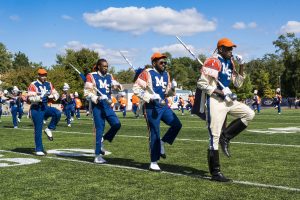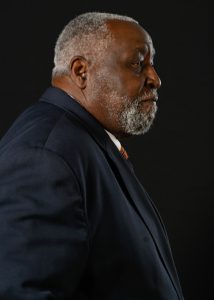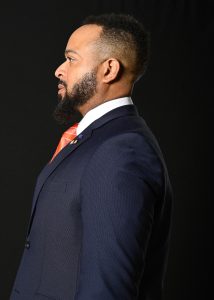By: B. Denise Hawkins
Morgan Alum and Longtime Bands Director Melvin Miles Passes the Baton in Retirement
Music — the universal language — has always spoken to Melvin N. Miles Jr., ’73 and ’78, Inside his childhood home on Baltimore’s west side, it began to whisper to him, first from his mother’s lips and later through her beloved showtunes that would waft from the family’s phonograph in the evening.
“My mother loved music,” he says. Although she didn’t play any instruments, “she sang little tunes and was a humongous listener.”
None of this was lost on Miles, the oldest of five siblings and the only one who built his life around music — making it as well as teaching it. After graduating from what was then Morgan State College with his bachelor’s degree, in 1973, Miles never left his alma mater, where he became a revered professor of music and its longest-serving director of university bands. After 49 years, Miles, an institution at Morgan, wrapped up his storied career.
I got up every day my feet hit the floor, to make a difference in students’ lives. It’s always been about the students.
– Melvin Miles Jr.
‘Something Special’
Miles was about 8 years old and enrolled in Coppin Elementary School when he learned to be a music maker.
“Like most kids, I wanted to play the drums and be in the school band, but back then, we had to share drums,” he recalls. “I wanted an instrument of my own that I could take home every day.”
With the help of his music teacher, Ruby Gill, Miles surveyed other instrument choices — the trombone was “too long and big,” and the clarinet had “too many buttons” — before settling on the cornet, which resembles a trumpet. “It looked like it would be easy to play, with just three buttons. I said, ‘That’s for me,’ ” remembers Miles, who by the time he entered junior high school knew that music and his instrument would have more to give.
He arrived at Calverton Junior High, a neighborhood public school, then new, to find a robust music education program he credits with “laying the foundation” for the musician he later became: “I learned all my scales there, major and minor. I played in the school orchestra and became really interested in all forms of music.”
Miles’ music teacher perceived his promise and potential. But Miles admits he wasn’t certain of himself until he concluded his first trumpet solo, John Morrissey’s “Soliloquy for Trumpet,” at a local student music festival. With the accompanying Calverton orchestra seated behind him, the young trumpeter stood at the front of the stage, in the spotlight, as applause filled the auditorium.
“At that time, I began to think that maybe I was doing something special” and had talent, Miles says. In high school, invitations to play trumpet with Frankie and The Spindles and the Whatnauts, local soul bands, was another affirmation.
I owe Mr. Miles a lot. He was a champion for all of us.
– Morgan alum Oscar Passley, Ph.D., Professor of Music, Dallas College, Eastfield Campus
Mentors and Music
Calverton was also where Miles met the first of several Black, learned, male mentors and musicians who recognized his talent, touched his life and taught him the language of music. Miles chose to rely on those men, and on Morgan, to put that language and those life lessons to good use.
“Chester Rowlette”: today, when Miles speaks the name of his Calverton Junior High band teacher and longtime mentor, it seems to hang in the air like a musical note he wants to savor. “Rowlette was awesome, just awesome. He’s the one who got me interested in writing music,” adds Miles. “I was fortunate to be in the right place at the right time with the right people” is a testimony that the 72-year-old Miles repeats these days as he reflects on a musical life that spans decades.
At Baltimore’s Frederick Douglass High School, Miles met Thomas Henry De Laine Sr., Ph.D., who became his music mentor there. De Laine was also a role model for the educator, guide and trusted friend that Miles became to his Morgan music students.
“Tom always wanted me to be and taught me to be the best trumpet player I could be. I (have) carried that with me throughout my life,” says Miles. “Because of him, I was able to play anything, from classical repertoires to jazz and pop music. That was a heck of a lesson,” adds Miles, who left a spot on his high school football team to learn where music and playing the trumpet could take him.
At De Laine’s funeral in 2014, Miles spoke about the man who also taught him life lessons and values amid the music: “Tom was my teacher, mentor and friend. He never stopped teaching us. He taught us style and swag. He was a man of impeccable taste.”
The summer after graduating from high school, Miles met yet another of his mentors: Reppard P. (“Repp”) Stone, Ph.D., a well-known musician and jazz composer and 1952 Morgan graduate. Dr. Stone lived near Morgan State’s campus, in the Morgan Park neighborhood, and led the music department at Delaware State College, now Delaware State University. He was popular with students for the jazz arrangements he wrote and that the students performed during football halftime shows. Dr. Stone convinced Miles to study music at Delaware State. Miles had made a tentative plan to enlist and play trumpet in the U.S. Navy, after a music camp at Hampton University had introduced him to the U.S. Navy Band. But with the increased U.S. involvement in the Vietnam War in the mid-1960s, Stone considered college a safer pursuit.
For about two years, Miles, the college student, zipped between classes in Delaware and gigs with The Sound Experience, a funk band founded at Morgan, and had a side job composing music. He was “having great fun” as he forged his path in the business and realized he could “make decent money” playing his instrument. But what felt more important to Miles was what he was learning outside the classroom — in an unlikely place — about music and being a man. Stone would deliver a kind of masterclass for one during the nearly two-hour weekend commutes the two would make between Baltimore and Dover.
“So, (Stone) is talking about things like music theory, dance harmonies and jazz the whole time we’re in his Volkswagen Beetle. These were intense music lessons,” Miles says excitedly. “At the time, he was working on a doctorate in music composition at Catholic University of America and would pass on to me the things that he was learning. Man, those were absolutely incredible rides.”
Eventually, Miles thought it made more sense to return to Baltimore to be closer to his band, so he transferred to Morgan to study music. When he arrived in 1970, Miles reconnected with his early mentor Thomas De Laine, who was then directing the Morgan marching and concert bands part time. Only two years after Miles joined the band and graduated, his alma mater hired him to first co-lead and, in later years, lead it.
“Who hires a 22-year-old, 23-year-old guy with a bachelor’s degree to run a band program?” Miles said in a 2015 interview with AFRO Media. He suspected Morgan couldn’t afford to hire someone more seasoned, but fortunately for the college and the students in the band, Miles said, “I knew what to do, and I was cheap.”
That was in 1973.

Building A Legacy
Miles spent the next 49 years at Morgan, teaching music and directing the University’s six bands, including the MSU Symphonic Winds, Concert Band, Jazz Ensemble, Jazz Combo, Pep Band (a.k.a. the “Bear Band”) and “Magnificent Marching Machine” marching band. Under his direction, the renown of these musical groups expanded over the years, with their performances across the country: before President Barack Obama at the White House, in the Macy’s Thanksgiving Day Parade, at the 147th Preakness and at the Monterey Jazz Festival, to name a few. Miles also added a Master of Arts in Music Education to his resume, earning the degree at Morgan in 1978, and was awarded an honorary Doctor of Fine Arts by his alma mater last December, during Morgan’s Ninth Fall Commencement Exercises, at Hill Field House, on campus.
The hours spent preparing and practicing, and the time on the road, writing arrangements and directing from the bandstand, were exhilarating but also grueling, Miles admits, especially during football season, when the work sometimes continued seven days a week. Still, he did not miss a beat when it came to his students, his legacy.
“I got up every day my feet hit the floor, to make a difference in students’ lives. It’s always been about the students,” says Miles.
 Oscar Passley, Ph.D., a music professor at Dallas College, Eastfield Campus, in Texas, and a classical and jazz trumpeter, is one of those legacies. He was a senior at Woodlawn High School, in Baltimore, and a trumpet player in the school’s band when Miles recruited him. It helped, says Passley, that Woodlawn’s band director was also a Morgan graduate. As Passley recalls that moment, he was in awe when he met Miles, the legendary musician and dynamic band leader.
Oscar Passley, Ph.D., a music professor at Dallas College, Eastfield Campus, in Texas, and a classical and jazz trumpeter, is one of those legacies. He was a senior at Woodlawn High School, in Baltimore, and a trumpet player in the school’s band when Miles recruited him. It helped, says Passley, that Woodlawn’s band director was also a Morgan graduate. As Passley recalls that moment, he was in awe when he met Miles, the legendary musician and dynamic band leader.
“Meeting Mr. Miles that day was like meeting a celebrity,” he says. Today, Passley calls Miles his mentor and friend. When Passley graduated from Morgan in 2002, he planned to use his degree in music education to become a middle school or high school band director, but Miles urged him to consider working in higher education.
“He flew me to the University of North Texas (UNT) to attend a conference with him,” says Passley. “He was always about creating opportunities and the right atmosphere for his students to learn and grow.” The experience led him to graduate school at UNT. “I owe Mr. Miles a lot. He was a champion for all of us,” adds Passley, who counts himself among the former students who strive to become the kind of caring teacher and guide for aspiring young people that Miles was for them at Morgan.
Miles’ legacy at Morgan is nothing short of legendary. Among his long list of credits for compositions that have provided the soundtrack for decades of memorable MSU moments, there is one that ranks first for many Fair Morgan faithful: “We Are the Bears,” an arrangement by Miles, composed with his sons Jarrett and Jermaine, remains a consummate Bears gameday favorite.
In 2022, amid a pandemic, Miles retired from Morgan, but not from music. He stepped down just shy of half a century at the University, but Miles says he knew that, at 49 years, it was time to “come home” and “begin to live a little longer with my family and friends.”
From his home in Baltimore’s Lauraville neighborhood, Miles is just beginning to unpack the boxes and memories that filled every inch of his campus office. Sometimes, when he’s standing in his driveway, he can hear the “Magnificent Marching Machine” striking up. To listen, though, says Miles, “means I’m working, and that work is over.”

Morgan’s New Maestro
The retirement of its legendary bands director, Melvin Miles Jr., left Morgan administrators with the task of filling a very large role in University life. But the selection of Jorim E. Reid Sr., D.M.A., as assistant professor, coordinator of instrumental music and the new director of bands in July 2022, after a nationwide search, allayed all concerns. Dr. Reid comes to Morgan with more than 27 years’ experience teaching music and music composition and nurturing the musical talents of young people at various stages of performance aptitude and education. Shaped by the storied HBCU band tradition, Reid served as director of bands and professor of music at Fayetteville State University and, before that, as assistant director then director of bands for 14 years at North Carolina Central University, before answering the call to join the Bears. He earned his bachelor’s degree in music at Florida A&M University and holds a master’s degree in music education from Florida State University and a Doctor of Musical Arts from Boston University.
“It is an honor to take on a storied band program built by the dedication of Mr. Melvin Miles,” says Reid. “His nearly 50 years at Morgan have established a solid tradition of musicianship and a solid reputation for high-quality performing ensembles. I will make every effort to ensure that Morgan’s legacy of unsurpassed band performance and achievements is always honored and continued.”







